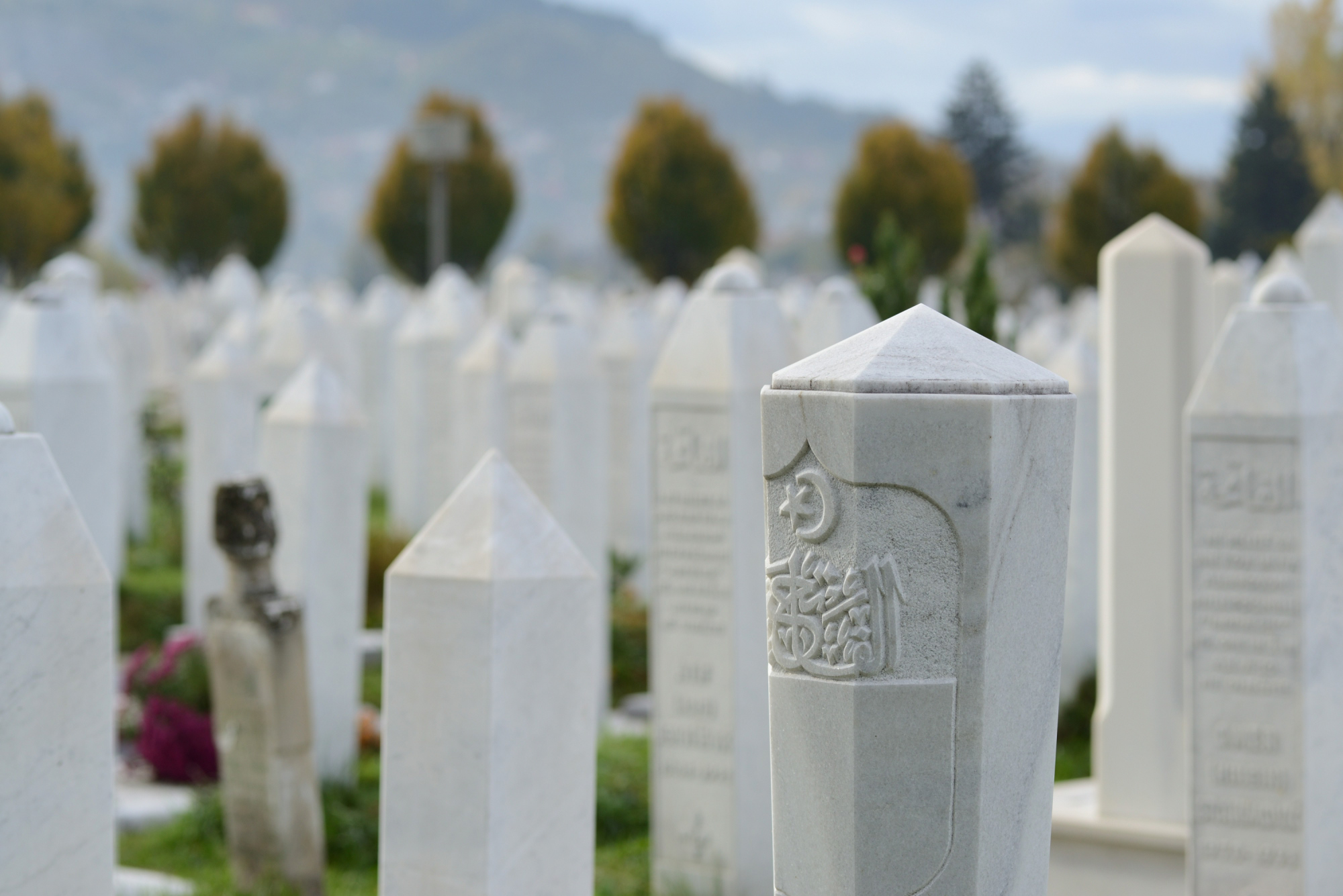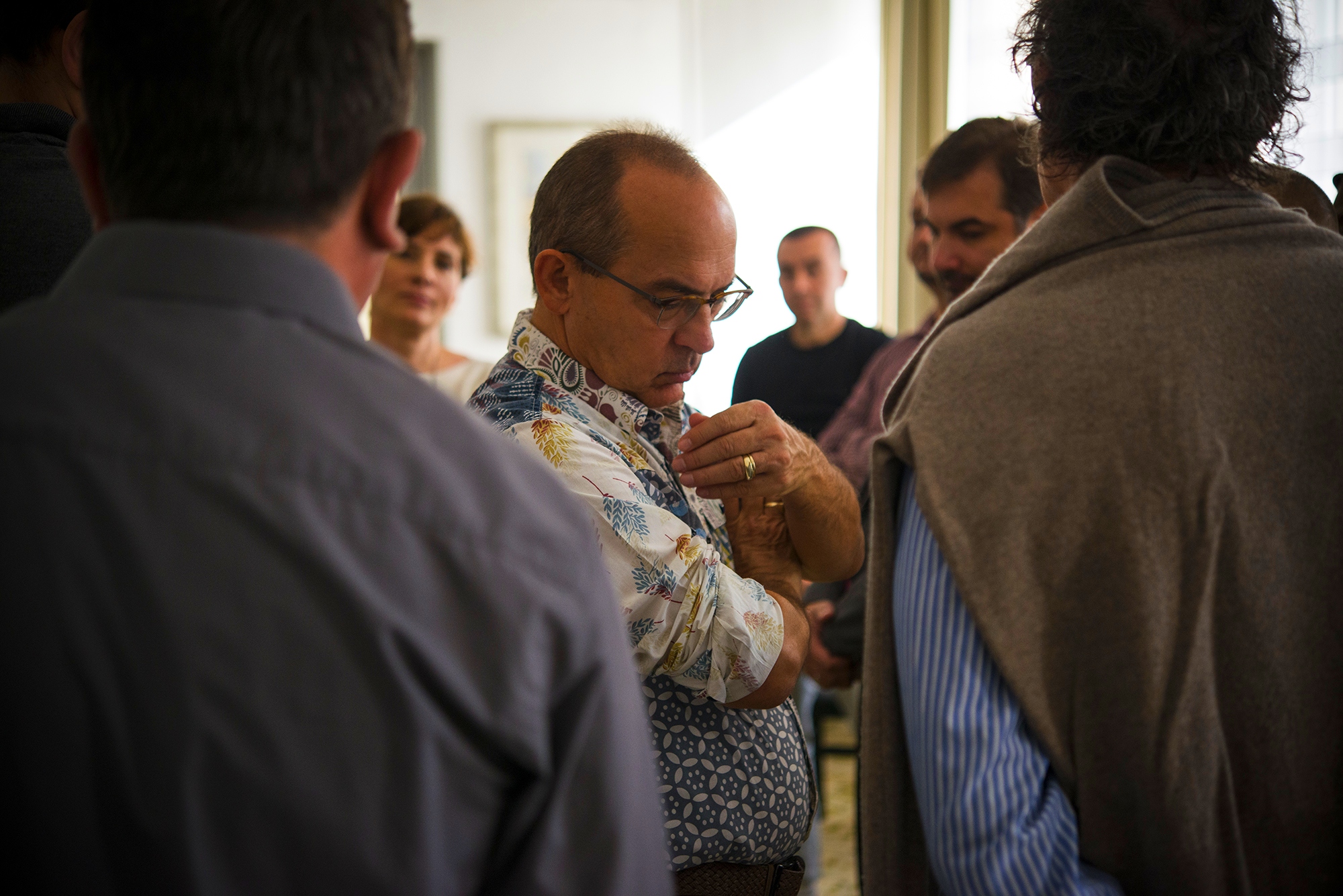When a country loses everything, it is left with history. But that isn’t a raw material; it’s a poison. There are countries where historians complain about being obsolete and countries where historians are so important and so much in the public eye that they receive death threats. Historians and peace activists from Croatia, Serbia, Bosnia and Herzegovina, and Austria met at the Round Table in Sarajevo following an invitation by the Centre for Nonviolent Action. What path should we take to get to the future, despite our shared criminal past? That, in short, is the topic that brought us together.
There is a cafe named “Habsburg” in Sarajevo, and a cafe “Ferdinand,” and at the beginning of the walking street there is an “Eternal Flame,” a memorial to the victims of the Second World War in the form of an actual flame. There are facades dotted with holes from bullets and shells, memorial plaques that speak of Serb war criminals who set fire to the city’s library, destroying two million books. There are fewer covered women than in Austria, two war museums, and a range of surrounding hills from which the army of the Bosnian Serbs shot at the city. White blots on the city map aren’t the blind spots of history; they are the sites where the dead of the most recent war are buried. For those who were not already aware, a late stroll through the rows of tombstones on the Muslim graveyards show how many people died in this city between 1992 and 1995.
A war full of displacement, tens of thousands dead, torture and genocide ended only 25 years ago and there can be no talk of forgetting. And yet, something without precedent is taking place in this “land of blood”: meetings of veterans from Croatia, Serbia and Bosnia who speak publicly about their participation in the war and together visit sites of suffering. The mere presence of mixed groups of war veterans at annual commemorations changes the nature of these events. Often, their presence results in the crossing out of hate-filled paragraphs in previously prepared speeches, lest those on the other side be offended. Some veterans have said that after attending such meetings together with former enemies, they were able to sleep without tranquilisers for the first time since the war. Why this organisation has not yet received the Nobel Peace Prize is a completely legitimate question.

The meetings of war veterans, former enemies, began already seven years after the end of the war. This was not the case in Austria. Let’s take a look back: for us, this would be the year 1952. At that time, nationalist talk around bar tables was still commonplace. A meeting of this sort in Austria at that time stretches the imagination. It didn’t happen in the 1960s or even much later.
Already during the introduction of participants at Hotel Bosnia, it became clear that it is not only the historians who are on the defensive: everyone who is not in line with the strictly circumscribed way of thinking is on the defensive. A spectre is haunting Europe and its name is revisionism. The questions of truth and scholarship itself play a minor role and in this battle, they are as much use as garlic is against vampires. I have rarely heard the call for historians to become activists, the desire for action, for abandoning the ivory tower. “What is the use of our research when no one reads it and when it has no impact?” Unusual actions are called for and history must take to the streets.
At this Round Table, representatives of historical scholarship met with activists, those searching for the dead and the missing, for whom confronting the consequences of war means searching for and digging for bones and skulls. Here there is a battle for memory, a battle for schools, for streets, but there are also critical voices “We are fighting about the problematic names for schools instead of for schools to be better equipped, so that education will be improved.”
Dialogue cannot offer answers, but it can open the door to better mutual understanding. “I like to be right. But I have learned to stay silent and to listen, to cultivate empathy.” This is not easy for everyone. Suggestions for possible actions are gathered. Perhaps we could draft a code of ethics for historians, a journal for exposing historical myths or an index of taboo topics related to the past.
The directive to analyse revisionism yields an unexpected result: there is a desire and a necessity is expressed for questioning history in terms of the displacement of Germans after the Second World War and the crimes committed by the partisan armies that were ignored in the former Yugoslavia. It is important to say goodbye to old myths so that we will be ready to fight the many new myths about the most recent war that are very much being constructed. The basis for these are facts about the numbers of those displaced and killed. Each side manipulates facts and uses arbitrary numbers of dead in order to establish their legitimacy. Survivors and the families of victims are being used to spread hate and to call for revenge and no one in public is ready to confront them. Even victims should not be allowed to do anything they want, but who will be the first to call them out? The taboos of one side are the narrative of the other side.

No one started the war; everyone was just defending themselves. When does war even start? When you psychologically prepare people so that it seems inevitable, when you hand out the guns, or when the first bullet is fired? In this region, nothing has been solved after the war. Two million people have been displaced and thinking along ethical lines has become the rule for the future. Empathy is horded as if it were a rare treasure. My dead, your dead, my tears, your tears. In the small park by Marshal Tito Street, which has retained its name despite suggestions to rename it, there is a monument to children killed in the siege of Sarajevo during the 1992-1995 war. When the suggestion was raised for the monument to be for all children killed in the war, a controversy erupted. The decision reached was clear: the monument would be dedicated only to the children killed within the besieged city. Still, the fact that there was a controversy is in itself encouraging because it indicates that the idea of a non-divisible empathy has not been completely eradicated. Not far from there, stands a monument in the form of a man calling towards an imaginary forest. This scene was recorded by journalists when a man was calling out to his fellow fighters to surrender to the armed Serb forces with the promise that their lives will be spared. The promise to spare their lives was not kept, not in this or thousands of other cases.
Small steps lead to better understanding, and the process of dialogue is a necessary component. For the Centre for Nonviolent Action, compassion for those on the other side is a completely natural thing.
As Gyorgy Konrad once said: there is too much history per square meter. This is certainly true for the Balkans. A preponderance of history per square meter in other countries makes it a haven for tourists, but here it is only a guarantee of the presence of death, or at least it has been up till now.
Robert Streibel
Historian from Beča, participant on Round Table in Sarajevo 14-15.10.2017.
Published on Augustin, izdanje 11/2017
(translation from German by Nenad Vukosavljević)